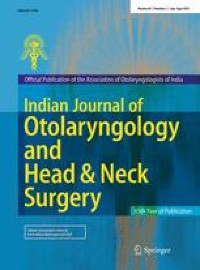|
Αρχειοθήκη ιστολογίου
-
►
2023
(256)
- ► Φεβρουαρίου (140)
- ► Ιανουαρίου (116)
-
►
2022
(1695)
- ► Δεκεμβρίου (78)
- ► Σεπτεμβρίου (142)
- ► Φεβρουαρίου (155)
-
▼
2021
(5507)
- ► Δεκεμβρίου (139)
- ► Σεπτεμβρίου (333)
-
▼
Ιουνίου
(567)
-
▼
Ιουν 15
(34)
- Contour Map Point Distribution and Surgeon Experie...
- Bone Cement Internal Auditory Canal Reconstruction...
- Matched Cohort Analysis of the Effect of the Facia...
- Cerebrospinal Fluid Leaks from the Lateral Ventric...
- Pituitary Tumor Surgery: Comparison of Endoscopic ...
- A Sweet Voice: Acute Febrile Neutrophilic Dermatos...
- Incidence of Olfactory Dysfunction and Associated ...
- Expressions of CXCL12, CXCL10 and CCL18 in Warthin...
- Analysis of COVID-19 Resulting Cough using Formant...
- Hyperparathyroidism subsequent to radioactive iodi...
- Predictive value of ipsilateral central lymph node...
- Evidence of Nasal Cooling and Sensory Impairments ...
- Factors Associated With Unanticipated Admission Af...
- Immediate Endoscopic Dacryocystorhinostomy in Pati...
- Neurofibromatosis 2: Primary Modality of Hearing R...
- Management of Cervical Tracheo-Esophageal Fistula ...
- Human Neutrophil Elastase Mediates MUC5AC Hypersec...
- Intracranial venous sinus stenting for the treatme...
- A Study of JCIH (Joint Commission on Infant Hearin...
- Neurosurgical anatomy of the floor of the third ve...
- Malignant struma ovarii with late recurrence harbo...
- Comparing surgical thoroughness and recurrence in ...
- The Impact of Surgical Posterior Nasal Nerve Cryoa...
- Efficacy of Repetitive Transcranial Magnetic Stimu...
- Prevalence of retromolar canal and its association...
- Assessment of the necessity of frontal sinostomy i...
- Comparison of cervical and ocular vestibular-evoke...
- Auswirkungen der COVID-19-Pandemie auf Konsultatio...
- Anterior cervical surgery to treat diffuse idiopat...
- Thresholds, Firing Rates, and Order of Recruitment...
- Temporomandibular Joint Arthrocentesis in Patients...
- Association Between Primary Headache and Bruxism: ...
- Association of Hormonal Contraceptive Use with Hea...
- Headache Attributed to Temporomandibular Disorders...
-
▼
Ιουν 15
(34)
- ► Φεβρουαρίου (628)
-
►
2020
(1810)
- ► Δεκεμβρίου (544)
- ► Σεπτεμβρίου (32)
- ► Φεβρουαρίου (28)
-
►
2019
(7684)
- ► Δεκεμβρίου (18)
- ► Σεπτεμβρίου (53)
- ► Φεβρουαρίου (2841)
- ► Ιανουαρίου (2803)
-
►
2018
(31838)
- ► Δεκεμβρίου (2810)
- ► Σεπτεμβρίου (2870)
- ► Φεβρουαρίου (2420)
- ► Ιανουαρίου (2395)
-
►
2017
(31987)
- ► Δεκεμβρίου (2460)
- ► Σεπτεμβρίου (2605)
- ► Φεβρουαρίου (2785)
- ► Ιανουαρίου (2830)
-
►
2016
(5308)
- ► Δεκεμβρίου (2118)
- ► Σεπτεμβρίου (877)
- ► Φεβρουαρίου (41)
- ► Ιανουαρίου (39)
Αλέξανδρος Γ. Σφακιανάκης
ΩτοΡινοΛαρυγγολόγος
Αναπαύσεως 5
Άγιος Νικόλαος Κρήτη 72100
2841026182
6032607174
Τρίτη 15 Ιουνίου 2021
A Study of JCIH (Joint Commission on Infant Hearing) Risk Factors for Hearing Loss in Babies of NICU and Well Baby Nursery at a Tertiary Care Center
Εγγραφή σε:
Σχόλια ανάρτησης (Atom)



Δεν υπάρχουν σχόλια:
Δημοσίευση σχολίου